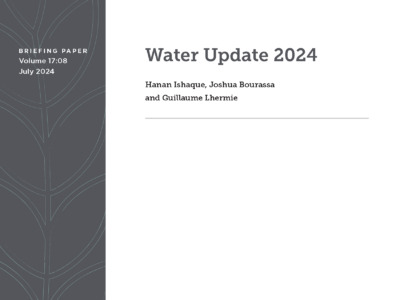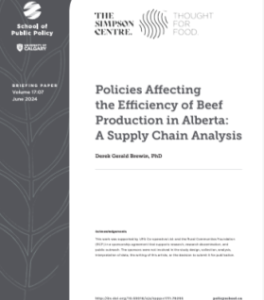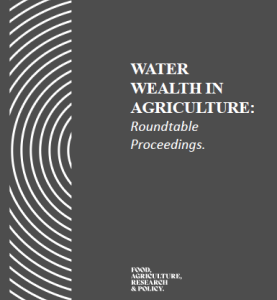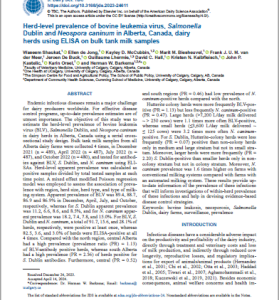Publications
The Water Wealth in Agriculture event was hosted in October 2022 in conjunction with the University of Calgary’s Simpson Centre, Schulich School of Engineering, Faculty of Science, and the University of Saskatchewan’s Global Institute for Water Security. It invited a diverse set of expert stakeholders from industry, government, and research (see annex) to discuss sustainable water management for agriculture. This paper summarizes the opinions and suggestions of the diverse interest groups attending the event about recent and current action on sustainable water practices.
Tuesday, July 16, 2024
Hanan Ishaque, Joshua Bourassa and Guillaume Lhermie
The focus of this paper is to determine whether earmarking health taxes or other revenue mobilizes greater public healthcare support as argued by the World Health Organization. We examine six case studies in which taxes or revenues have been earmarked to support public healthcare: Brazil, France, Germany, the Philippines, South Africa, and South Korea. We find that earmarking does not lead to more revenue spent on healthcare on a sustained basis, except for experiences in the Philippines and for long-term care in Germany.
Wednesday, July 10, 2024
Janice MacKinnon, Jack M. Mintz, and Mukesh Khanal
The global food system refers to the interconnected network of production, distribution, and consumption of food on a worldwide scale. Its objective is to ensure food security. Over the last 50 years, continuous improvements in farming methods, new technologies, and infrastructure capacity in international supply chains have allowed for a more affordable and safer food supply for an increasing global population. This has fostered domestic and foreign political stability. Fueled by the liberalization of exchanges and the rise of agri-food giants, and under the influence of cheap fossil fuels and mineral fertilizers, agricultural systems worldwide have converged towards industrial agriculture to feed a growing population that is also adopting similar food habits. Globalization and large-scale public policies have enabled billions of people to escape food insecurity, mostly in low- and middle-income countries. However, food security has come at a large environmental cost and has not always been successful in terms of equity. Particularly in Western countries, unhealthy and unsustainable diets are becoming the norm, while producers are caught in the crossfire between more stringent environmental policies and the economic push for competitiveness in international markets.
Saturday, June 01, 2024
Guillaume Lhermie
Shoppers face high beef prices at the supermarket, but those prices are not a reflection of what Canadian farmers and ranchers earn from their cow-calf herds. In the past 30 years, the average beef producer’s operating margin has never reached $50,000, despite the fact that the average beef farm’s asset base stands at more than $2 million.
Better access to export markets, including the U.S., South Asia and North Africa, would help to remedy the producers poor returns. Export prices would need to cover production costs, the largest of which is feed for the producers’ cattle herds, accounting for 77 per cent of the average ranch’s cash costs.
Saturday, June 01, 2024
Derek Gerald Brewin, PhD
The Water Wealth in Agriculture event was hosted in conjunction with the Simpson Centre for Food and Agricultural Policy, University of Calgary, and the Global Institute for Water Security, University of Saskatchewan. The event brought together a diverse set of stakeholders concerned about water management from the perspective of industry, government, and research. Roundtable discussions were facilitated to discuss problems and potential solutions regarding sustainable water management for agriculture, and water management more broadly.
Friday, May 31, 2024
Endemic infectious diseases remain a major challenge for dairy producers worldwide. For effective disease control programs, up-to-date prevalence estimates are of utmost importance. The objective of this study was to estimate the herd-level prevalence of bovine leukemia virus (BLV), Salmonella Dublin, and Neospora caninum in dairy herds in Alberta, Canada using a serial crosssectional study design.
Source: Journal of Dairy Science
Friday, May 31, 2024
Waseem Shaukat, Ellen de Jong, Kayley D. McCubbin, Marit M. Biesheuvel, Frank J. U. M. van der Meer, Jeroen De Buck, Guillaume Lhermie, David C. Hall, Kristen N. Kalbfleisch, John P. Kastelic, Karin Orsel, and Herman W. Barkema
- 1
- 2
- 3
- …
- 10
- Go to Next Page






